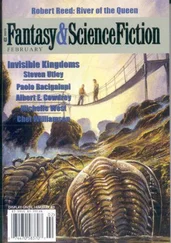“Hey, who’s bleeding?” Doreen asked. She was looking at the floor by her feet, where Everett had been standing a minute earlier.
Clete turned to snarl at her, but then he paused, frowned. Pax could see the bad thought forming in his brain. Travis should have been back by now, but Rhonda had kept talking and talking.
Pax looked up at Rhonda. Her expression was strangely sad.
“Travis?” Clete called in a strangled voice. He bolted for the door. “Travis!” He shouldered Doreen aside and ran through the doorway-and vanished.
Pax had seen nothing but a blur moving in from the right, and then Clete was knocked out of the frame, gone as if he’d been snipped from a film.
Doreen screamed and ran out of the room. Pax followed.
Clete was on his back, Everett on top of him, one hand braced against Clete’s neck, the other clenched into a fist. He struck Clete once, twice. A white tooth shot out of the boy’s mouth like a spitball.
“Paxton!” someone shouted. Barron, tied to his chair twenty feet away, nodded fiercely at the floor. Clete’s pistol lay almost at the guard’s feet. Pax ran for it, moving awkwardly with his arms tied in front of him. He bent to scoop it up and then suddenly he was knocked sideways. He crashed into an end table, fell onto his side. His ribs, still sore from the beating weeks ago, erupted into fresh fire.
Doreen had tackled him. She grabbed the pistol, jumped up, and swung it toward him.
Pax scrambled to his feet. He seemed to hear the gunshot a moment after he ducked. He didn’t know where the bullet went, didn’t know if he was hit.
There was nowhere to hide. Nothing in the lobby but two chairs, a couch, a few potted plants.
Doreen fired again. Pax ran pell-mell for the double doors that led to the patient rooms, wild with the need to escape. The thirty feet to the doors seemed to stretch to the length of a football field. Finally he banged through the doors, and then he was falling against the second set of doors and onto the floor beyond. He hit with his forearms in front of him and pain shot through his elbows.
His father’s room was just ahead, the first door on the right. Pax tried to push himself to his feet, but his arms wouldn’t work. He got his knees under him, then stood and stumbled forward. He dropped his bound arms like a club onto the door’s handle and pushed it open with his shoulder.
His father was sitting up in bed, staring at the television.
Pax pushed the door closed and then leaned against it. “Dad.” His father glanced at him, frowning, and then looked back at the TV. A female announcer said something about a state of emergency.
“Dad . We have to block the door.”
Over the noise of the TV he thought he heard the sound of another gunshot, but from this distance, through so many doors, he couldn’t be sure.
“Dad! I need you to listen to me.”
His father slowly shook his head. “It’s happening again,” he said.
The handle rattled, and then the door opened a few inches and bumped against the back of the dresser drawer. “It’s okay Paxton,” Aunt Rhonda said, sounding exasperated. “It’s safe to come out now.”
It took him a minute to shove the furniture out of the way. Rhonda came into the room with a paper mask held over her nose. The cuff of her sleeve was stained with dark blood. Her hair was in disarray.
“We aren’t dead, in case you were wondering,” she said, her voice muffled.
“Are they ?” Pax asked.
“They ought to be.”
“I think you should see what’s on the news,” he said.
He moved out of the way so Rhonda could see the screen. His father said, “It’s bigger this time. A whole city.”
“What’s bigger?” Rhonda asked.
“The Changes,” Pax said.

A TRIO OF beta girls stood awkwardly on the sidewalk, pinned in place by cameras and lights and microphones. One of them answered a question while the other two looked on. They didn’t seem to want to speak to the reporters, but they didn’t move away either. They may have been blanks, but they were also teenage Americans; they didn’t know how to say no to television.
Pax stepped off the sidewalk to avoid the clump of media people surrounding them. He’d tried to drive to the clinic, but the downtown streets were packed. He’d been forced to park down on Bank Street, a quarter mile from the center of town. News vans, television trucks, and rental cars lined the street ahead of him; strange faces crowded the sidewalks. All this, just to cover the “local angle.”
Before the Changes, the world had never heard of Switchcreek, Tennessee. And until yesterday, not many more had ever heard of Babahoyo, Ecuador. Now they were sister cities, united in disaster, death, and acts of God. Sodom and Gomorrah separated by two thousand miles and thirteen years.
At least a thousand were dead in Babahoyo, and who knew how many more were stricken. The exact numbers varied by news channel, but every hour the estimates climbed.
After Clete’s botched kidnapping yesterday, Pax had sat in his father’s room for most of the afternoon, watching the news. When he went home that night he kept the TV on, unable to look away: the cameras panning over rows of the sick laid out in hospital beds or across the floors of churches and schools; the close-ups of brown faces bleaching to chalk; the repetitive soundtrack of grunts and moans and cries in Spanish. And then, like a bizarre commercial break, a word from our previous victims, the people of Switchcreek. He saw Rhonda interviewed twice, and no one could have guessed that a few hours before she’d been duct taped to her chair and held at gunpoint. Back in the studios, scientists and special correspondents described the nature of TDS, charted its three variants, predicted that the current wave of TDS-A would give way to strains of B and C, and speculated baldly on the disease’s causes and probable vectors of transmission. It was painfully clear that in thirteen years no one had made much progress in understanding the disease.
The cameras always returned as soon as possible to South America, to shots of Ecuadorians twisting in agony as bone and muscle frantically tried to outrace each other. He wondered if they’d call themselves argos or choose a Spanish name.
He reached the clinic, but the front door was locked. He pressed the doorbell, waited. A plaque next to the door declared the building to be THE PHILIP MAPES MEMORIAL MEDICAL CENTER. Philip had been Rhonda’s husband, if he remembered correctly.
After half a minute he pressed the doorbell again just as a shadow moved behind the glass. He stepped back as Dr. Fraelich worked the keys in the lock and pushed the door open a few inches.
“Is this an emergency, Mr. Martin?”
“Why, are you closed?”
“I’m a little short on staff.” She saw something in his face. “What?”
“Is it Doreen? I was hoping you’d heard from her. Or from Rhonda.”
Dr. Fraelich glanced over his shoulder. “You better come in before the reporters notice. They keep asking for interviews.”
She locked the door behind him, then led him down the hallway.
“I saw you on CNN,” Pax said. “All two seconds.”
“I was hoping no one had seen that.”
“I’ve been watching too much TV,” Pax said. “I couldn’t stop watching. All those people…”
“I thought you looked a little shell-shocked.” She pushed open the office door. The room looked as crowded and messy in daylight as it had that night. He sat on the same chair he’d used before. Dr. Fraelich turned off her computer monitor and sat opposite him, her legs crossed. She wore a wrinkled, French-blue shirt and charcoal slacks. Her black shoes were scuffed at the toe.
Читать дальше










